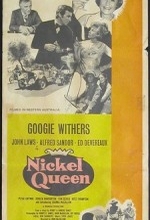
NICKEL QUEEN
Australia, 1971, 89 minutes, Colour.
Googie Withers, John Laws, Alfred Sandor, Ed Devereaux,
Directed by John Mc Callum.
Nickel Queen seemed, on its first release in 1971, a poor example of Australian film-making. It seemed to exaggerate all the ocker characteristics - to the embarrassment of local audiences. However, it was immediately popular, especially in Western Australia (with appearances by the Governor, Sir David Brand and two ministers - Arthur Griffith and Charles Court). John Mc Callum was responsible for the film, not only for production but also for co-writing and for the direction. It is not quite his forte. His wife Googie Withers enjoys herself as the tough owner of a hotel in a ghost town, who becomes feted as the Nickel Queen. She has not been very much used in the Australian film industry. Radio personality John Laws plays an odd hippy guru of the late 1960s style. A number of reputable Australian actors and actresses, including Ed Devereaux, appear to better advantage. The film echoes the mining boom of the late '60s and early '70s and the enthusiasm of quick fortunes. It also highlights the bizarre aspects of hippy movements in the late '60s - as seen from the comfortable desk of the film-writers.
However, in the hindsight of the developing Australian film industry, the film appears as a pleasant ocker comedy and does not seem nearly so bad as when it was first released. It finds its place along with a lot of the popular television series of the '70s which captured for the ordinary audience a lot of the moods and humour of the times.
1. The impact of the film on its first release, prior to the rebirth of the Australian industry? The lack of films to compare it with? As seen in retrospect in the light of so many films of the '70s and '80s? Qualities, weaknesses?
2. The use of Western Australian locations, ghost towns, the outback? The pubs? The use of Perth locations? The atmosphere of 1970 - the mining and resources boom, the hippie movement? The reaction of Perth society? Special effects, comic effects? The musical score and Sven Libaek music and songs?
3. The portrayal of so-called typical Australian characters, humour? The conventions of the outback ghost town, the miners, gambling, the pub? University life and demonstrations and arrests? Hippies on the move and their settling in the outback? Big business - especially multinationals and their unscrupulous money-making and exploiting? High society and people responding to the wealthy? The film's comic view of Australia as well as its touching on relevant themes?
4. The plausibility of the plot - easy fortunes in the Australian tradition with mining? Spies and scouts, staking of claims? Shrewd people succeeding? Meg Blake and her shrewdness, her enjoying her success? The presentation of the hippies and Claude? The presentation of the multinationals and their methods - Ed Benson and his henchmen? The honesty of Ray Olding and his investigations? The picture of upset in the universities as represented by Jenny? The story of the claim , the manipulation of the stock market, the spending spree in Perth? Audiences identifying with this?
5. Googie Withers' style as Meg Blake? Tough, age, handling of situations, the men in the pub, staking the claim? Her aboriginal assistants in the hotel and with the profits from the claim? Her friendship with Harry Phillips and his having to teach her a lesson? Her fascination by Claude and his becoming a gigolo and associating with her in Perth? Her response to Ed Benson? Her gauche ways in Perth society? Her learning her lesson and going back home?
6. The contrast between Harry as the genuine prospector, the honest man, the telling of the truth to her, even in Public and the exposure of the multinationals with Claude and his entourage, settling on the station, needing money, transforming himself to get money from Meg, his role as Gigolo, his getting off with Benson's wife?
7. The comment on multinationals exploiting Australian resources and Ed Benson's style, lack of scruple, being exposed by the honest Australian Harry? The comedy of his wife forever eating - and her getting away with the money and Claude?
8. The hippies and their values? Jenny and her arrest? Going back to Perth with Arthur, the sequence of everybody falling into the pool etc.? The settling down of the hippies? The glimpses of the range of characters representing Australian society: the miners and their shrewdness near Spinifex Hill, the geologists, the henchmen for the multinationals, Perth high society, hotel staffs, the ministers and the Governor of Western Australia?
9. How humorous the film? The particular qualities of ironic Australian humour? Farce? Good humour covering many faults?